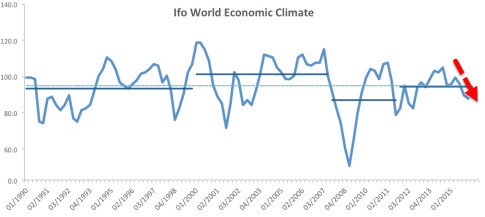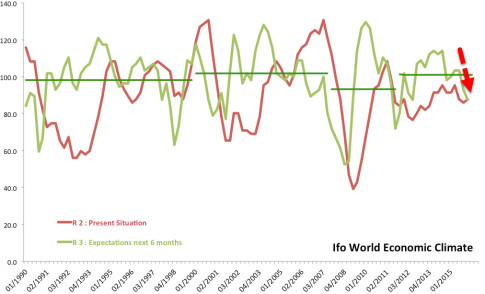– World Economic Climate Index Tumbles:
Global growth leading indicators are screaming it, Baltic Dry Index is screaming it, PMIs are screaming it, BRICS are living it, and now Ifo surveys are showing it: global economy is heading into a storm.
The latest warning is from the Ifo World Economic Climate Index.
Per Ifo release:
“The Ifo Index for the world economy dropped from 89.6 points to 87.8 points this quarter, drifting further from its long-term average (96.1 points). While assessments of the current economic situation brightened marginally, expectations were less positive than last quarter. The sharp decline in oil prices seems to be having no overall positive economic impact. Growth in the world economy continues to lack impetus.”
In numbers, thus:
- Headline World Economic Climate Index is now averaging 88.7 over the two quarters through 1Q 2016, which is statistically below 97.7 average for the 2 quarters through 3Q 2015 and 93.2 average for 4 quarters through 1Q 2016. Current 2 quarters average is way lower than 8 quarters average of 98.4. Historical average is 94.9, but when one considers only periods of robust economic growth, the index average is 98.9. Again, current 2 quarters average is significantly below that.
- Present Situation sub-index 2 quarters average is at 87.0, which is woefully lower than 2 quarters average through 3Q 2015 at 91.6 and is well below 96.0 average for the historical series covering periods of robust economic expansions.
- Expectations for the next 6 months sub-index is at 90.4 on the 2 quarters average basis, down from 103.5 2 quarters average through 3Q 2015 and below historical (expansion periods only) average of 101.5.
?Geographically, per Ifo release:
“The economic climate deteriorated in all regions, except in Oceania, Asia and Latin America. In Oceania the climate index stabilised at a low level, and in Asia and Latin America it edged upwards. The indicator is now below its long-term average in all regions, with the exception of Europe. The climate in the CIS states and the Middle East clouded over, especially due to poorer economic expectations.
In Europe WES experts are slightly less positive about future economic developments than in October 2015. In North America and Africa, by contrast, the slightly less favourable economic situation led to a deterioration in the economic climate.”
Of course, all that this means is that central planners will have more excuses for more repressive and extreme measures to “save” us from ourselves.

